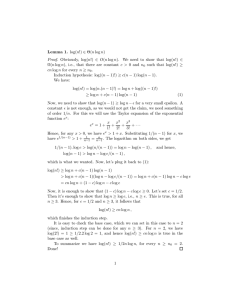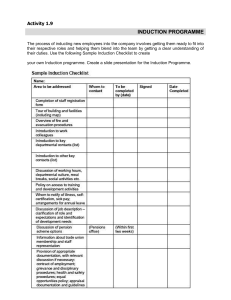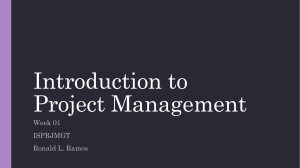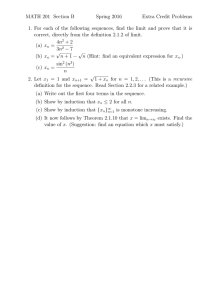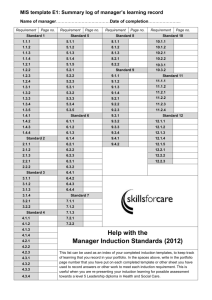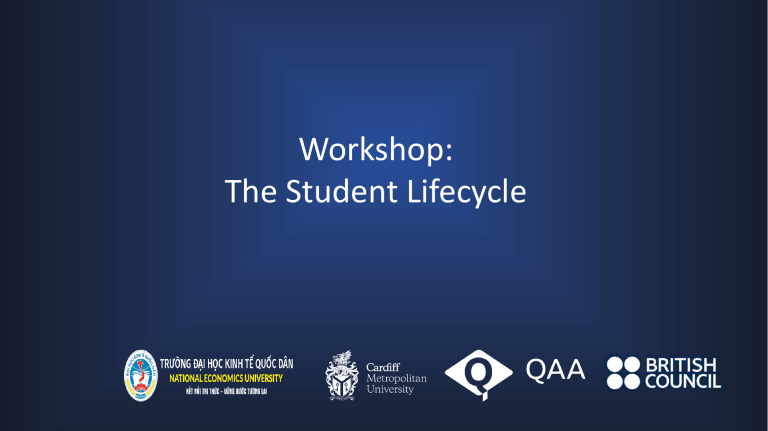
Workshop: The Student Lifecycle Introduce the student lifecycle model Analyse the phases of the model Contextualise the model Connect to wider HE projects/research Awareness of current HE environment Provide ‘real life’ examples Which ‘phase(s)’ of the lifecycle do you think you are currently involved in? Can you provide some examples? HEA Project. What Works? • Belonging • Identity • Success • Retention • Engagement Towards and In Phase Why are the first two stages so important? Ozga & Sukhnandan (1997) transition from school to university is the greatest hurdle, most withdraw in first year. Induction has been shown to impact on the retention and achievement of students (Sheader and Richardson, 2005) Ozga & Sukhnandan (1997) transition from school to university is the greatest hurdle, most withdraw in first year Cardiff Metropolitan University Withdrawal Hotspots October/November January March/April Discussion In Phase “induction activities should have a range of functions, but in particular they should facilitate learners to build social relationships with fellow students and members of staff, and enable them to assess whether the course is relevant to their current interests and future aspirations.” (Thomas, 2012) Characteristics relevant to an ideal Strategically located and managed induction Address academic, social and cultural adjustments that students may face Provide time relevant targeted information Be inclusive of all student groups Address special needs of all student groups Make academic expectations explicit Include teaching staff at a personal level Develop required computing and e-learning skills Recognise existing skills and experience Be part of an ongoing extended programme Evaluated with outcomes and actions communicated to stakeholders (Fry, Ketteridge & Marshall, 2009) Active Learning Induction Programme Day 1 Setting the Scene Expectations/Aspirations (PTs/Task) Getting to Know the Team/Peers Students given a research task to complete in groups Day 2 Activity Day Introduce project task Day 3 Freshers Fayre Collect data Day 5 Dragons Den Campus Celebration Tutors facilitate and support – 121 and group work Task informed by engagement with external agencies Day 4 Breakfast (alumni) Aspire Meeting (PT) Group Task Research tasks force engagement with key services Feedback - Students “Impressed how they inducted us…… the way they showed us ….. other people in my group showed me how to lay out the presentation – I had no idea, it’s been a long time since school. It was helpful” “You go to lectures and you recognise faces and you can talk to people and know who you get on with. The week was good for that, for getting to know people better. The orienteering was good ….for getting people in groups because characters come out.” “My preferred method of learning is by doing tasks and challenges...it was really great to learn about things I usually just walk past” “ It’s what I came to university for!” “It was great to get out of lecture theatres and to see what the City was like. I loved meeting past students and the students from the year above”. “I thoroughly enjoyed the days. The biggest benefit was meeting and bonding with other students, and gaining confidence in my own abilities” “I was dreading doing the project but it was great fun. I actually went in the library, found some information and printed my poster” Lizzio, A. (2011) Succeeding@ Griffith: Next Generation Partnerships across the Student Lifecycle found at http://www.griffith.edu.au/learning-teaching/student-success/first-year-experience/student-lifecycle-transition-orientation - Student Lifecycle Framework HEA Student Lifecycle Approach – (webpage) http://www.heacademy.ac.uk/resources/detail/inclusion/Student_lifecycle Sheader, E.A. and Richardson, H.C. (2005) Home – but not alone. HomeStart: a support network for students not living in university accommodation in their first year. Manchester: TRDN Cited in Hassanien,A. and Barber,A. An evaluation of student induction in higher education. International Journal of Management Education 6 (3), 35-43. Found at http://www.heacademy.ac.uk/assets/bmaf/documents/publications/ijme/vol6no3/ijme6380pagehassanienbarber.pdf Ozga, J. & Sukhnandan, L. (1997) Undergraduate non-completion. In Undergraduate non-completion in higher education in England (Research report 97/29). Bristol, Higher Education Funding Council for England. Thomas,L. (2012) Building student engagement and belonging in higher education at a time of change: final report from the What Works? Student Retention and Success programme found at http://www.heacademy.ac.uk/assets/documents/what-works-studentretention/What_works_final_report.pdf Fry, H., Ketteridge, S. and Marshall, S. (2009) A handbook for Teaching and Learning in Higher Education; Enhancing Academic Practice. London, Routledge. Tinto, V. (1975) Dropouts from higher education: A theoretical synthesis of the recent literature. A Review of Educational Research, 45, 89125 Bean,J. and Eaton,S. (2002) The psychology underlying successful retention practices. Journal College Student Retention, Vol.3 (1), 73-89 found at http://homepages.se.edu/native-american-center/files/2012/04/The-Psychology-Underlying-Successful-Retention-Practices.pdf Astin, A.W. (1984). Student involvement: A developmental theory for higher education. Journal of College Student Personnel, 25, 297-308. Cited in Scholarship in teaching research summary, Induction & Retention in the first year. Found at http://asproject.ljmu.ac.uk/eaqs/EAQS_Docs/Induction_Research.pdf Yorke, M. & Longden, B. (2008) The first-year experience of higher education in the UK, Final Report. York, Higher Education Academy http://www.humanities.manchester.ac.uk/tandl/policyandprocedure/documents/HEA_%20First%20Year%20Student%20Experiences%20Feb 08.pdf Quality Enhancement Themes: The First Year Experience – Curriculum design for the first year found at http://www.enhancementthemes.ac.uk/docs/publications/the-first-year-experience-curriculum-design-for-the-first-year.pdf?sfvrsn=18 Hunt,L. and Chalmers,D. (2013) University Teaching in focus – A learning centred approach, London, Routledge. Summary of Workshop
